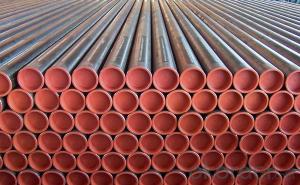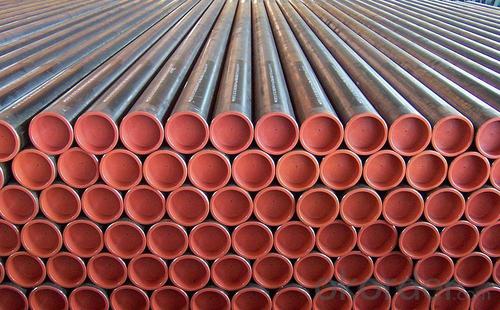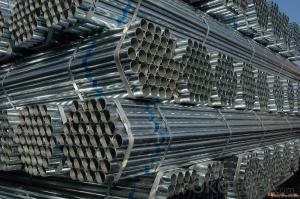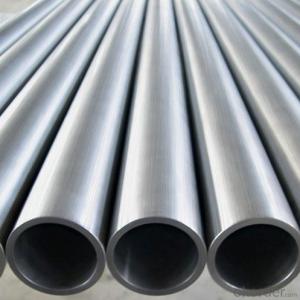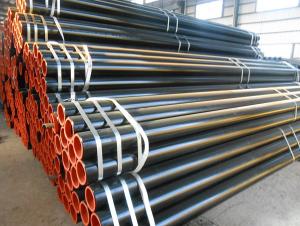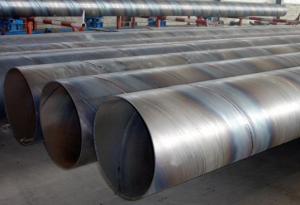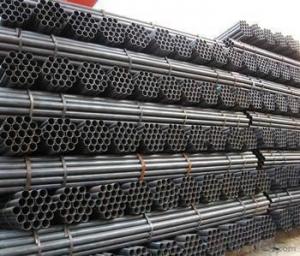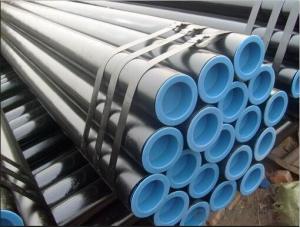ERW WELDED STEEL PIPE FOR OIL,GAS,WATER DELIVERY
- Loading Port:
- Tianjin
- Payment Terms:
- TT OR LC
- Min Order Qty:
- 20 m.t.
- Supply Capability:
- 20000 m.t./month
OKorder Service Pledge
OKorder Financial Service
You Might Also Like
Product Name | Longitudinally welded steel pipe / ERW Steel pipe / Carbon steel pipe/ HFW steel pipe | |
Size | OD | 4"-32"/114mm-813mm |
Thickness | 6.5mm-20mm | |
Length | 6m-23m | |
Steel Material | GR.B X42 X52 X56 L245 L290 L360 L415 S245 S290 S360 S390 S355JR S275 | |
Standard | API 5L PLS 1 | |
Usage | Oil Pipe, Casing Tube, Line Pipe and Fluid (Water, Gas) Transmission | |
Surface | Bared Black Painting, Anti-Corrosion Coating | |
Proctor | Plastic cap | |
Package | Bundles, Bulk | |
Inspection | With Hydraulic Testing, Ultrasonic testing or X-ray Test | |
Certificate | API and ISO9001;2000 | |
Date of Delivery | Less Than 15/20/25/30/40/50/60 Days According To The Quantity | |
Payment: | L/C or T/T | |
Port of Shipment | Xingang,China | |
- Q: How are steel pipes used in the food processing industry?
- Steel pipes are commonly used in the food processing industry for various applications such as transporting liquids, gases, and solids. They are utilized for moving ingredients, process water, and cleaning solutions within the production line. Additionally, steel pipes are used for steam and heating systems, allowing for efficient cooking and sterilization processes. They possess excellent corrosion resistance and durability, ensuring food safety and maintaining hygienic standards in the industry.
- Q: What is the difference between black steel pipes and galvanized steel pipes?
- Black steel pipes and galvanized steel pipes differ in their coating. Black steel pipes are uncoated and have a dark, matte appearance, while galvanized steel pipes are coated with a layer of zinc to prevent corrosion. The galvanization process provides added protection and durability, making galvanized steel pipes suitable for outdoor or high-moisture environments.
- Q: What is the impact of steel pipe size on flow rate and pressure?
- Both the flow rate and pressure are significantly impacted by the size or diameter of a steel pipe. To begin with, the flow rate represents the amount of fluid that can pass through the pipe within a given time frame. A larger diameter allows for a greater flow rate as it provides more space for the fluid to move through. This is because a larger cross-sectional area creates less resistance for the fluid. Consequently, increasing the size of the steel pipe generally leads to an increase in flow rate. Additionally, the size of a pipe affects the pressure within it. As the fluid flows through the pipe, it encounters friction against the pipe walls, resulting in resistance. This resistance causes a drop in pressure along the length of the pipe. A smaller diameter pipe experiences higher frictional losses, leading to a greater pressure drop. Conversely, a larger diameter pipe reduces frictional losses, resulting in a lower pressure drop. Therefore, increasing the size of the steel pipe typically leads to a decrease in pressure drop. It is important to note that although increasing the size of a steel pipe generally leads to a higher flow rate and lower pressure drop, other factors can also influence these parameters. These factors include the properties of the fluid, the length and layout of the pipe, and the presence of valves or fittings. Therefore, it is crucial to consider all these factors and perform accurate calculations or simulations to determine the specific impact of steel pipe size on flow rate and pressure within a given system.
- Q: How are steel pipes used in the automotive industry?
- Steel pipes are commonly used in the automotive industry for various applications such as exhaust systems, fuel lines, and structural components. These pipes provide durability, resistance to corrosion, and high strength, making them ideal for transporting gases, fluids, and supporting the vehicle's structure.
- Q: How are steel pipes used in sewage treatment plants?
- Steel pipes are used in sewage treatment plants to transport and distribute wastewater throughout the facility. They are crucial in carrying raw sewage from the intake point to various treatment processes such as sedimentation tanks, filtration units, and aerobic/anaerobic digesters. Additionally, steel pipes may be utilized for pumping treated or partially treated wastewater to outfall locations or for reuse purposes. The durability and corrosion resistance of steel make it an ideal choice for handling the harsh and corrosive nature of sewage, ensuring long-lasting and efficient operation of the treatment plant.
- Q: What is the cost of steel pipes compared to other materials?
- The cost of steel pipes can vary depending on various factors such as size, grade, and market conditions. However, generally speaking, steel pipes tend to be more cost-effective compared to other materials like copper or PVC. Steel is a durable and versatile material that offers exceptional strength and longevity, making it a popular choice for various applications.
- Q: How are steel pipes used in the construction of water supply systems?
- Steel pipes are commonly used in the construction of water supply systems due to their durability, strength, and resistance to corrosion. These pipes are used to transport water from the source to various points of distribution, such as buildings, homes, and industries. Steel pipes are often buried underground or installed above ground, depending on the specific requirements of the project. Additionally, steel pipes can withstand high pressure and are suitable for carrying large volumes of water, making them a reliable choice for water supply systems.
- Q: Can steel pipes be used for electrical conduit systems?
- No, steel pipes cannot be used for electrical conduit systems as they are conductive and can pose a safety risk. Non-metallic conduits, such as PVC or fiberglass, are commonly used for electrical wiring to ensure insulation and protect against electrical hazards.
- Q: What are the disadvantages of using steel pipes?
- One major disadvantage of using steel pipes is their susceptibility to corrosion. Over time, exposure to moisture and certain chemicals can cause the steel to rust, leading to structural weakness and potential leaks. Another drawback is the high cost of steel pipes compared to alternative materials such as plastic or copper. Additionally, steel pipes are relatively heavy and can be challenging to handle and transport.
- Q: What are the advantages of using steel pipes in marine applications?
- There are several advantages of using steel pipes in marine applications. Firstly, steel pipes are highly durable and have a high resistance to corrosion. This is crucial in marine environments where pipes are constantly exposed to saltwater, which can cause rapid deterioration of materials. Steel pipes are able to withstand the harsh conditions and maintain their structural integrity for extended periods of time. Another advantage of using steel pipes in marine applications is their strength. Steel is a strong and robust material that can withstand the high pressure and extreme conditions often encountered in marine operations. This makes steel pipes ideal for transporting fluids, such as water, oil, and gas, in marine environments. Additionally, steel pipes offer excellent fire resistance. In the event of a fire on a ship or offshore platform, steel pipes can provide a reliable fire barrier, preventing the spread of flames and ensuring the safety of personnel and equipment. Furthermore, steel pipes are highly versatile and can be easily fabricated to meet specific requirements. They can be manufactured in various sizes, shapes, and thicknesses, allowing for customization to fit the specific needs of marine applications. Steel pipes can also be easily welded together, providing a seamless and leak-proof system. Lastly, steel pipes are cost-effective in the long run. Although the initial investment may be higher compared to other materials, the durability and longevity of steel pipes make them a cost-efficient choice. With minimal maintenance and a long lifespan, steel pipes reduce the need for frequent replacements, resulting in significant cost savings over time. In conclusion, the advantages of using steel pipes in marine applications include their durability, resistance to corrosion, strength, fire resistance, versatility, and cost-effectiveness. These factors make steel pipes a reliable and efficient choice for various marine operations, ensuring the safe and efficient transport of fluids in harsh marine environments.
Send your message to us
ERW WELDED STEEL PIPE FOR OIL,GAS,WATER DELIVERY
- Loading Port:
- Tianjin
- Payment Terms:
- TT OR LC
- Min Order Qty:
- 20 m.t.
- Supply Capability:
- 20000 m.t./month
OKorder Service Pledge
OKorder Financial Service
Similar products
Hot products
Hot Searches
Related keywords
